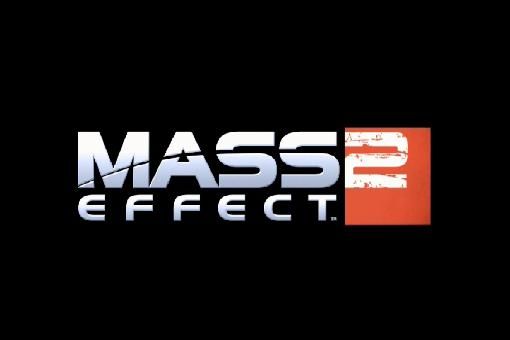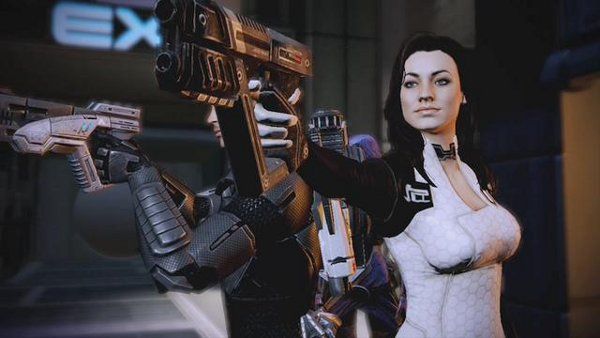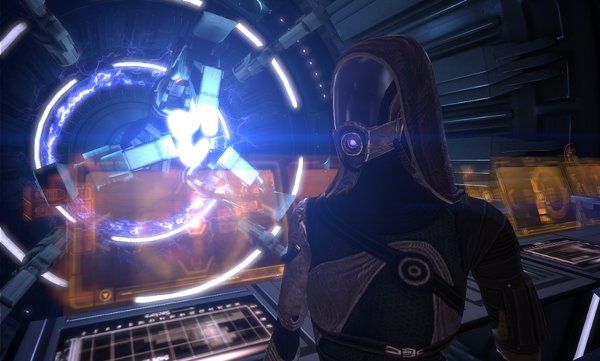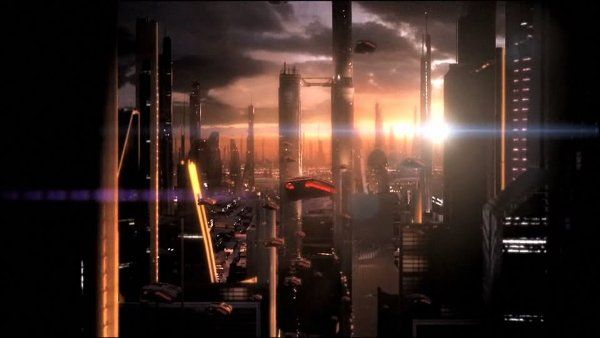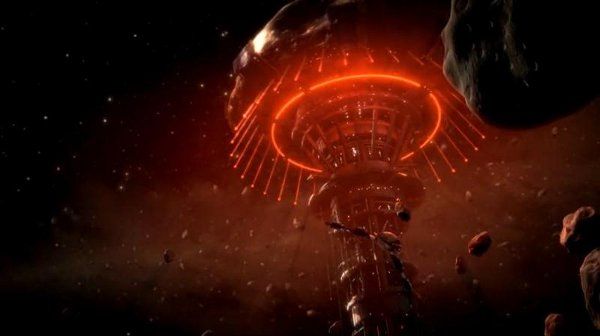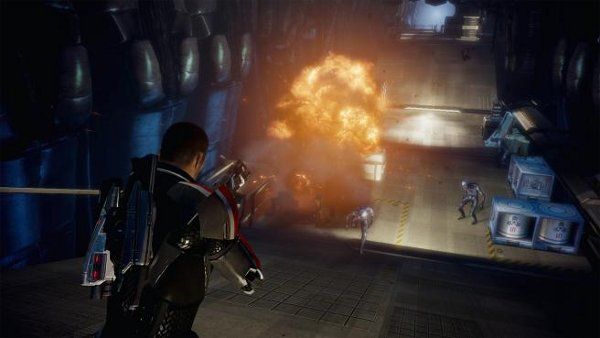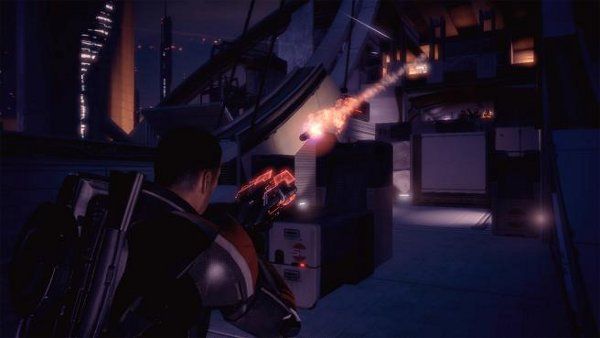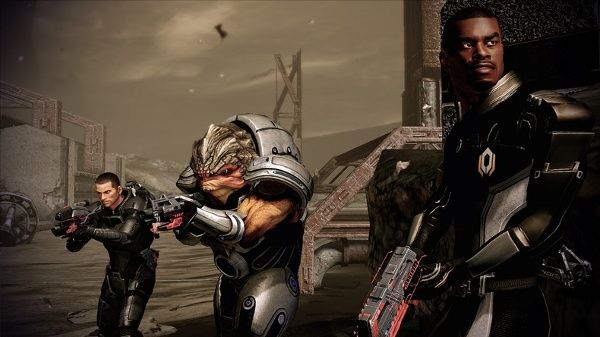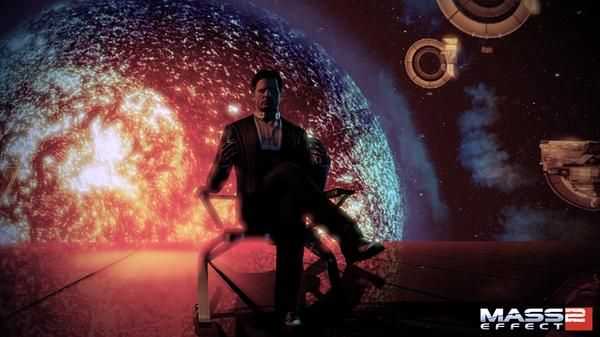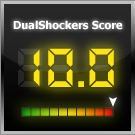Bioware has once more seen fit to allow us to enter the awe-inspiring, dangerous, provocative universe of Mass Effect - and what a journey it is. From the sleek, clean lines of the previous game's Citadel, to the cool mysteriousness of the Asari colony world Illium, and on to the rough and tumble debauchery of Omega, we're taken on a wild and crazy ride that surpasses the original in almost every way imaginable. We meet interesting characters with greater depth than the likes of Master Chief or Cloud Strife and are allowed to shape the way the universe perceives us and the outcome of many a situation by the way we act and the decisions we face more than any other game that has come before.
Just about everything in Mass Effect 2 is arguably improved over the first title. Initially, before I got my hands on the game, I was worried about reports of the game removing the inventory system altogether (instead of refining it), removing individual mob kill experience, removing the many options of armor and weapons we had in the first game and adapting the fast-paced battle system into an even more streamlined shooter. I admit, I was a bit hesitant. While I do still miss some of those aspects, I have to say that the refinements actually work to make a better game, even if those same changes also serve to shift the game's genre to something I'm unfamiliar with. As with any good Bioware game, though, it is all built around the story.
Without spoiling anything that the various promotional trailers haven't already spoiled, we follow the first game's hero, Commander Shepherd, on a journey to save mankind once more. Being the second part of a trilogy, Mass Effect 2 continues the plot of the first, but also is comprised of a self-contained story that will catch you up on major events from the first title if you haven't played it. Although, I have to say, if you don't import the character from a cleared Mass Effect save, the game loses a bit of depth and connection to the characters and events that build this universe (more on this later). For some reason, human colonies in outlying systems are mysteriously disappearing. The Alliance that Shepherd served in the first game has turned a blind eye to this, and the possible causes behind it, so another organization - Cerberus - takes matters into its own hands. Cerberus is a human interest organization that strives to carve humans a solid place in galactic civilization, and they're willing to do just about anything to see that task through. Although, at the same time, they aren't xenophobic, they welcome aliens and anyone else who will serve their purposes. They seem to have the right idea, but their methods are questioned throughout the majority of the galaxy. And so, once this enemy is discovered, it's Shepherd's task to put together the ultimate team to take these baddies out.
While playing through this story, I was so engrossed in what was going on - regardless of what I was doing in-game - that everything else around me just faded away. I wasn't sitting on my sofa staring at a television, I was actually there, watching these events unfold, watching these conversations take place and enjoying the ambiance around me. Conversation trees naturally flow from one topic into the next when you interrogate someone for more information. It actually sounds like you're having a conversation and isn't just an algorithmic response to the choice you make. There also seem to be more decisions, more dialog and more ways to drive a conversation than there was in the first game. There is also a new "interrupt" feature that appears at various points in certain conversations. When the interrupt icon pops up on screen during a conversation, if you hit the corresponding trigger button you'll stop the conversation in its tracks and perform an action. Which action you perform depends on whether it is a paragon interrupt or a renegade one. Sometimes both appear, sometimes it's one or the other, and it is not based on your current morality level. You can choose to make use of the interrupt or not, you can choose a renegade response if you think it's best for the situation, even if you're wholly paragon and vice versa. It adds a wonderful new dimension to conversations. My only problem is that I wish there were more instances where these interrupts become available, as they're pretty sparsely used throughout the game.
Another story-related mechanic I must touch on is the integration Mass Effect 2 has with the original game. If you have a cleared game from Mass Effect, you can import your character. You aren't just importing her model, but you're pulling in all the decisions you made in the previous game, as well. (Note: I played a female Shepherd in the first game and imported her for my play-through of Mass Effect 2, so I'll be referring to Shepherd as "her".) The integration works well and really affects various encounters and interactions throughout the game, starting right from the beginning. I felt doing this added another layer of depth to the character development in the game, as well as made myself connect better to Shepherd herself. If you play from Mass Effect straight into the sequel - importing the character - I would assume it feels like much the same game on the story side of things. That's a compliment to what Bioware did with the import feature, and I absolutely love it. In addition to what it adds to the story, importing a character also grants you bonuses to credits, materials, paragon/renegade points and a few other perks based on the level and status you achieved in the previous game. At the same time, it isn't something that is required to enjoy the game, so newcomers to the franchise can feel free to pick up the second game and get right into the action.
The art direction is stunning, and this adds to what I mentioned above - the game makes me feel like I'm actually there by providing just the right atmosphere for each location. It draws you in in an almost surreal way. Fairly early in the game you spend some time on Omega, a colony built out of the crater on a mining asteroid. You'll quickly find yourself in a club called Afterlife with heart-pounding music, pole dancers, seedy customers and both real and virtual flames caressing the various corners and corridors you'll pass through. It brought out something in me that most games don't even come close to doing - it inspired imagination, wonder, creativity. It got the wheels in my head spinning a hundred miles an hour. Later on in the game you'll be on the Asari colony world of Illium, taking on some story-related missions in the capital city of Nos Astra. In almost every exterior balcony location you're granted access to sweeping views of the rest of the city and I would find myself just staring, dozens of minutes at a time, out into the city, wondering what a particular building is for, wishing I could drop down to street level and see the city from that vantage point or just generating a scene in my head of what everyday life would be like for an average citizen. It's games like this that inspire this creativity and it's also probably why I enjoy the sci-fi genre so much as a whole.
In the various areas you visit, the art direction, along with the musical score, work together to define each location - its attitudes, its philosophies, its inhabitants, its culture, its boundaries. From the largest city to the smallest ship, each location is unique and inviting. You don't just go there because you have to for part of the story - you want to go there, you want to get involved in the culture, you want to eavesdrop on conversations of the inhabitants, you want to explore. The conversations you can overhear, the constant news broadcasts, people passing you by going about their everyday lives, the vendors trying to get you to check out the latest and greatest merchandise, the setting of each location, the milieu, the need to be there - it all adds together into a miraculous bundle of elation that I've rarely, if ever, seen or felt before in any game I've played.
Shifting gears, let's talk about the battle system and related mechanics. To be quite honest, the changes in the act of firing your weapon itself didn't seem that much different from the first game, although aiming seems to be more fluid and easier to accomplish, at least for those of us who aren't used the whole whole shooter thing. In the first hour or two of the game I realized that my worries about the game moving in an even more mainstream direction with firefights were unfounded, as I found the whole thing quite enjoyable. Just like the previous game, you can position your party members and give them commands from the ability wheel that is opened with the right bumper. Unlike the first game, your teammates do a great job of being smart - they stay behind cover, they avoid environmental hazards, they feed you information on their situation. All this helps you determine the best course of action at any given moment.
Cover plays a more important role in this second game, as well. I find it highly satisfying to duck behind cover, popping up to take potshots at the enemy. This is even more fun if you can use sniper rifles, which is honestly one of my favorite aspects of battle, sitting back taking out enemies from afar while my teammates get their hands dirty. Again, choosing your party members correctly for any given situation is a help, but not a necessity. It's more fun to choose according to your play style. I enjoyed usually having two biotics accompany Shepherd on her missions, because I have decent weapon skills and, most importantly, the ability to use sniper rifles. Throw in bits and pieces of engineering-related skills and a cloak, and I was pretty set by myself. Pair a couple heavy biotic users like Miranda, Samara or Jack with my Infiltrator and we can pretty much handle any situation if I play smart. If you want a more "in your face" team or a full team of snipers, you have that option, too. There are so many party members this time around that you can pretty much have any group make up you can imagine.
Inventory management has gone the way of the dodo in Mass Effect 2, as has mixing and matching equipment to get just the stats you want. I'm not sure I agree completely with each of these changes from the previous title, however, as I mentioned earlier, the new mechanics just work. So, you really don't miss the stronger RPG elements that were removed. Instead of swapping out gear at will, everything is upgradable - your weapons, armor and, of course, abilities. As you gain more party members, you acquire greater access to needed upgrades. You also gain upgrades by finding them on the battlefield or as the game progresses. To make these upgrades, you must acquire various minerals. These minerals can be found in smaller quantities in the field, but the main method of acquiring these is through the planet scanning mini-game, which I'll get to in a moment. Once you have the needed minerals, you can produce an upgrade to either armor, weapons, the Normandy herself or to individual team members. Some upgrades work on just a single person, some are made across the board for your entire party. Upgrades can also be used to give Shepherd new abilities or clear the board and redistribute her ability points altogether.
Upgrading your skills works much like the previous game. Each time you level up you acquire skill points to use for every party member, regardless if they were with you on the mission or not. These skill points are used to improve various skills. The skills are fewer in number than the previous game, but still potent nonetheless. When you reach the maximum level for a skill, you can choose one of two different evolutions for that ability. One usually is more offensive in nature, and one is more defensive. Although, with biotics, your choice tends to come down to a more powerful single-target ability or a less powerful area of affect application. Again, it all depends on your play style.
What comes as an odd surprise, given the amount of RPG elements Bioware completely dumped, is how you can aesthetically customize your armor. You have a few variations of armor to choose from for Shepherd to use in the field, each with a slightly different stat boost. From there you can choose the gloves, boots, helmet and shoulders, as well as change the color, material and pattern of the gear itself. This is also where you can swap to the various special armor sets that you may have acquired through other means, like the Collector's Edition armor, or the Dragon's Blood armor from pre-ordering Dragon Age: Origins way back when. Unfortunately, you can't remove the helmet at all from these sets (even during cut scenes), so that kind of defeated the purpose for me, since it screwed with my immersion.
There are several smaller mini-games that you take part in on various occasions, which is an expansion from the previous title. To hack doors or safes, you play a "memory" mini-game, where you mouse over various nodes to see what symbol they hold, and have to match up similar symbols within the time limit to bypass the lock and gain access to whatever is there. When you hack into information-related devices such as computer terminals or iPad look-alikes, you're presented with a scrolling interface with blocks of text spread in three columns across the screen. One text block is displayed at the top and you have to select the corresponding block as the columns scroll up, avoiding blocks with a big, red "X" in them. Once you match up three blocks of text, you gain access to the information. In most cases, the hacking of items is optional, and rewards you with credits, weapon upgrades or other non-critical items. But, sometimes you have to perform a hack to proceed with the story. In most cases the default time limit to perform these hacks is very generous, but there are upgrades to increase the amount of time you have, if you feel so inclined.
The larger of the three mini-games is the planet scanning and mineral finding aspect. At any time once you have freedom of movement with the Normandy, you can explore planets and scan them for resources. To be quite honest, this is the biggest issue I had through the whole game. Planet scanning is fun the first few times, but very quickly it gets boring and repetitive. It also made my left hand cramp up on more than one occasion. When you scan a planet, you enter into orbit and must hold down the left trigger to scan. You can't let this up or the scanning action will stop. As you hold down the left trigger, you move the scanning reticule across the planet, while watching the read-out to the right of the screen for spikes in any of the four mineral columns. When there is a spike of any size, you'll know it because the controller will vibrate. At this point, you'll want to find the peak of the spike and hit the right trigger to launch a probe to the surface, thus gathering the mineral. This method of mineral extraction definitely fills your need for upgrades easily, but it is incredibly boring and tedious after a while. There are a lot of planets to explore initially, and even more open up as you progress through the game and purchase star maps for other clusters.
The trick to this is spreading it out between missions. Don't progress half way through the game before you decide to start mining ore, because then you'll be stuck needing upgrades and having to sit for hours on end going through this mind-numbing mini-game repeatedly. Instead, after each mission make sure you do a bit of mining, and you should have no problems affording the upgrades you need to help your crew through tough times ahead.
There are also optional side-quests you can take part in, although it seems to be a fewer number than the first game, which is unfortunate, as it was one of the few Western-style RPGs that maintained a constant focus on the main story while giving you a sizable number of options for side-questing and exploration. But, in the second game, that focus is increased even more, not just through the fewer number of side questing options, but by giving you good galactic navigation and creating a psychological need to progress with the story through a sense of urgency and commitment to the task at hand. Whenever you back out to the galactic map, which shows up when you get ready to make a jump between clusters, you're shown in no uncertain manner exactly where you need to travel for each main story related mission - it's a constant reminder held over your head that you have those out there, waiting for you. Although, when you do partake in side quests, they're often more interesting than the reused mine or bunker destinations from the first game. Some side quests are more information-related, and those take place generally on major hub worlds such as the Citadel, Omega or Illium. There are also some quests that take you out into the galaxy at large. Even some missions that seem to be related to the main story may be optional, such as recruiting certain party members or completing their personal loyalty quests, as the game only requires a certain amount of these quests complete to continue with the story.
One thing that did bother me about the side quests isn't really that they were fewer in number than the first game, but that they were difficult to find. Sure you had your easy quests which were typically contained within the current quest hub you were exploring - go talk to this person and convince them to do this, go deliver this piece of equipment to that person on the other side of town. Those types of things. But, the more intricate optional questing relies a lot on planet exploration and, besides a few that you can start by reading messages on your personal terminal aboard the Normandy, you're stuck scouring the galaxy hoping to come across an anomaly on a planet you scan. This, just like the mineral scanning, can be tedious if you want to find every last thing in the game.
But, ultimately, you do have a lot to do between major story missions, so you're never really left hanging at any point, including fraternizing with your crew. Like the first game, you can become romantically involved with a member of the crew. The options open to you vary depending on your Shepherd's gender, as some members of the crew will fall for the opposite gender only, while some will go either way. It's all about the dialog options, which is why it's important to make the rounds after every mission and speak to all your party members, as well as some other crew members such as your pilot, yeoman and doctor. Sometimes, though, I kind of wondered if a conversation would ever progress past the point of being a professional relationship between two ship-mates. Sometimes you can go for very long stretches - several story missions worth of time - where the crew members will basically tell you to get lost, they don't want to talk now. On top of that, as soon as you start a crew member's personal quest, they won't speak to you about anything else and will constantly ask you if you can ferry them to the location they requested. This is a bit annoying and, in a way, misleading, especially for those who actually want to garner a deeper relationship with a certain crew member they have their eye on. Ultimately, though, the flaws in this title, while definitely present in certain aspects, are far outweighed by the sheer enjoyment of traversing this galaxy and following these characters on their fast-paced, possibly deadly, quest.
What else is there to say? A lot. There are so many nuances I could go on and talk about for hours. For those who know me, I'm a huge RPG fan and an advocate of the tried and true JRPG, yet this game, which I personally don't even consider an RPG, is likely to be in my top 10 list of favorite games ever. I felt that the first Mass Effect was excellent, and I believe this one surpassed it in just about every way. There is little to complain about here, and the switch in game play focus to more of a shooter than an RPG isn't a travesty, but a blessing. Bioware once again goes outside the box and proves that a game can have a cinema-like feel, well written characters and an intricate, involving story that will entice you and draw you in so that everything else around you fades away. It is yet early in the year, but Bioware has what could be "Game of the Year" material here, starting off the new decade with a bang. I highly recommend playing this game to everyone - whether you enjoy RPGs, shooters, action/adventure titles or whatever else. The experience itself is well worth the time and effort spent to traverse one of the best designed games I've played in a long time. You won't regret it and you'll fall under a spell from which you may not want to be released.
- Game: Mass Effect 2
-
Platform Reviewed: Xbox 360
- Developer: Bioware
- Publisher: Electronic Arts
- Release Date: 1/26/2010
- MSRP: $59.99
- Review Copy Info: A copy of this game was purchased by DualShockers, Inc. for purposes of this review.
Mass Effect 2
- Franchise
- Mass Effect
- Released
- November 20, 2007
- Developer(s)
- BioWare
- Publisher(s)
- Electronic Arts
- Genre(s)
- Action RPG , Third-Person Shooter
- ESRB
- M for Mature: Blood, Language, Partial Nudity, Sexual Themes, Violence

